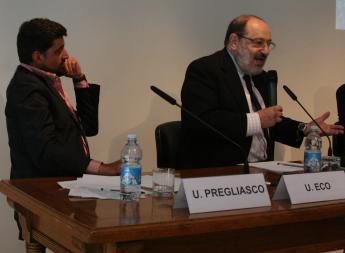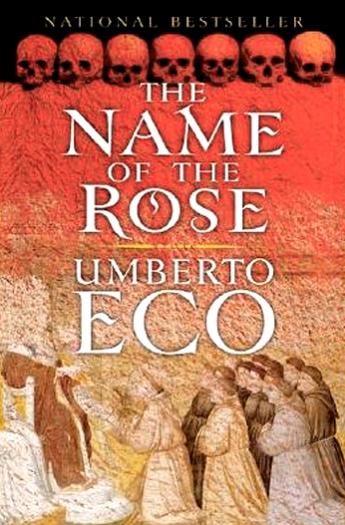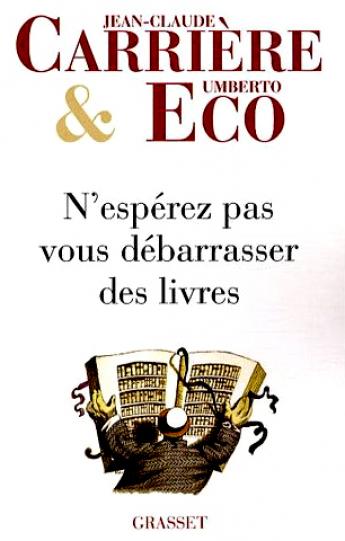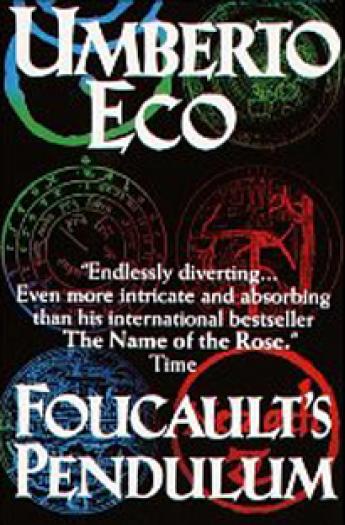Associazione Librai Antiquari d'Italia
A Bibliophile of huge Ec(h)o

Umberto Pregliasco
Fresh from his stint as Special Guest Curator at the Louvre (no less!), in September 2010 Umberto Eco will open the ILAB-LILA International Congress and Book Fair with the lecture The Vertigo of the List and of the Catalogue. “The subject of lists has been a theme of many writers from Homer onwards. My great challenge was to transfer it to painting and music and to see whether I could find equivalents in the Louvre, because frankly when I suggested the subject I had no idea how I would write about visual lists”, he said at the Louvre.
In honour of the ‘lingua franca’ of bibliophily, which, together with English, is an official language of the ILAB-LILA, his lecture will probably be given in French. By his presence Professor Eco does both ALAI and ILAB a great honour, and I would like to introduce him here not as the best-known living Italian writer, nor as the professor of semiotics: I would like to talk about Umberto Eco as a bibliophile, revealing the Liaisons dangereuses between the collector and his own "pusher" of ancient books. It is rare for a bookseller to have a customer who offers so much intellectual exercise and information, as well as money, for the books he buys.
Some time ago, an important bibliophile wrote in a letter:
"An insatiable passion possesses me, which even today I cannot and would not stop... I never grow tired of books. Perhaps I have more than necessary; but books are just like everything else: getting what you seek stirs further the desire. Besides I look for different kinds of books; it could be because of the author who wrote them, or the subject they deal with, but they are faithful and beloved friends at the same time, they are ready to blame you, to give you advices..."
When my adventure in the antiquarian books began, e-mails couldn't even be imagined, fax didn't exist and bibliophiles rarely went to the expense of a phone call. So, every morning I waited expectantly for those postcards which brought orders for the books offered in our catalogues. Before that, orders came in beautiful handwritten letters, and clients shared their confidences and not only about books. The bibliophile who many centuries ago wrote "...as they give us so many benefits, they don't need any food or drink and they are satisfied with cast-off clothing and a place to lay their head” was Francesco Petrarca. Sadly I don't posses any of Petrarca's autograph letters, but I guard jealously bibliophilic letters from other notable customers such as Benedetto Croce, Luigi Einaudi and obviously Umberto Eco.
The ALAI, of which I've been president for the last 6 years, owes him a lot. Through his novels he has made a much wider public familiar with the world of medieval libraries and ancient books. I had the privilege of meeting him some 30 years ago, while he was writing Il nome della rosa, when he used to come often to our bookshop in Turin. I like to think that back in the Fifties, as a penniless and unknown student, Eco timidly looked for books in my grandfather's shop situated near the Turin University College, where he lived during his studies; studies which resulted in a degree thesis about the aesthetics of Thomas of Aquinas. I share many things with Eco, beside our "Piedmontesity" and our love for books, we also share the delight in playing with words and puzzles. He was very amused by a neologism that I coined when he let his beard grow again, and by my recent discovery of a slip in the advertisement of the book series on the Middle Ages he has edited for an Italian newspaper. In that advertisement there was a monk portrayed writing on a XIVth century antiphonary, but the text was unexpectedly turned toward the reader!
Even the fact of having the same name has helped the relationship: I still preserve the letters which he entitled “Dear Omonimo”, those in which he pointed out some inaccuracy in my catalogue, and even his complaints because a book he was looking for was already sold to others. Sometimes I wonder which comes first in Eco's novels, the chicken or the egg: I ask myself if it's the writer’s need which guides the book collection, or the possession of certain books which inspires the writing. One thing is for sure, all of his novels are supported by a deep study of antique texts as shown in Il nome della rosa with herbaria, texts on drugs, labyrinths and the Inquisition. The Name of the Rose is a biographical tribute to Jorge Luis Borges, represented in the novel and the film by the blind monk and librarian Jorge of Burgos. Borges, like Jorge, lived a celibate life consecrated to his passion for books, and also went blind in later life. Needless to say, my dream would be to find a manuscript of the lost second book of Aristotle's Poetic, the one about laughing which causes Jorge's homicides and the fire in the library - surely the source of the worst nightmares for any antiquarian bookseller.
The same meticulous research on texts about alchemy and Rosicrucianism can be found in Foucault's Pendulum, where three editors amuse themselves by inventing a conspiracy theory regarding the Knights Templar. For The Island of the Day Before, about a man in the Renaissance marooned on a ship within sight of an island which he believes is on the other side of the international dateline, Eco sought out books on the Jesuit order, navigation and astronomy. In this novel only the watchful eye of a bibliophile would notice that almost all the 40 chapters coincide with XVIIth century book titles. Some are more famous such as the Grand’Arte della Luce e dell’Ombra by Kircher, the Serraglio degli Stupori by Garzoni, the Cannocchiale Aristotelico by Tesauro the Nautica rilucente by Pietro Rosa or L’Orologio oscillatorio by Huygens, others are less well-known such as Labirinto del mondo e paradiso del cuore, published in Czech by a Mr. Komeneski in 1631. In short, even the index is a downright hymn to bibliophily.
Eco's studies continued with books and texts about the siege of Casale, Crusades, Coniate and Barbarossa for the writing of Baudolino, a knight who saves the Byzantine historian Niketas Choniates during the sack of Constantinople in the Fourth Crusade. Claiming to be an accomplished liar, he leaves the historian (and the reader) unsure of just how much of his story was a lie. He researched comics and magazines of the Thirties for The Mysterious Flame of Queen Loana, in which the protagonist is actually an antiquarian bookseller named Giambattista Bodoni who emerges from a coma with only memories of the books of his childhood.
Throughout the years therefore Eco turned often to ILAB booksellers all around the world, looking for books on a great variety of subjects. A certain friendship began, sealed with mutual exchange of information – his knowledge of bibliography and the real importance of a book is exceptional – and I for one am certain that his intellectual contributions to ‘our world’ are infinitely more valuable than his commercial ones, however much money he spends!
I cannot help but recall the epistolary relationship between the English bookseller Anthony Hopkins and the American collector Anne Bancroft in the elegant 1987 movie 84 Charing Cross Road, or the more carnal one – but still related to a 17th century book – between the bookseller Johnny Depp and the diabolic Emmanuelle Seigner in Polanski’s The Ninth Gate, based on the novel by Pérez-Reverte.
Anyway, I’ve never been able to guess the exact theme of the novels Eco was working on, but then as usual he would send me a copy of his latest work with the dedication:
«so you’ll understand why I needed that book…».
One of Eco’s bibliophilic essays is titled The vegetal and mineral memory. The book on paper, vegetal record of human civilization, came after the first mineral record in cave paintings and the animal one in manuscripts written on vellum. I’m sure the printed book will be joined, but hopefully not supplanted, by the new record – mineral again – this time on silicon chips.
So, let’s hope not to get rid of books … and especially next September in Bologna!
39th ILAB Congress and 23rd International Antiquarian Book Fair
Bologna, September 20-26, 2010
More information ...



